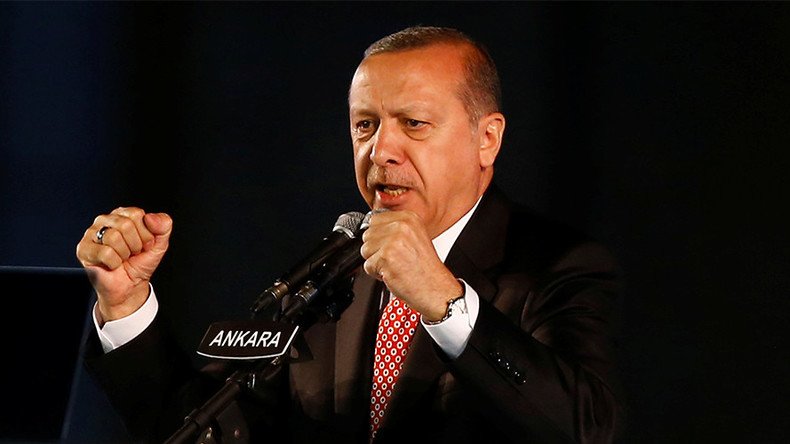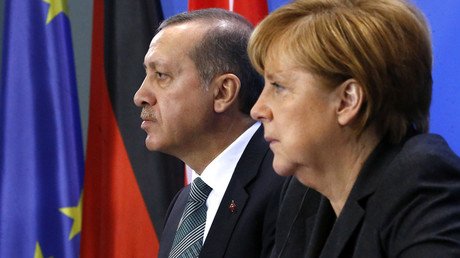Erdogan tells Germany to ‘pull itself together’ as rift deepens

Turkish President Recep Tayyip Erdogan has dismissed media reports that Ankara provided Berlin with a ‘black list’ of German companies over terrorism-support suspicions, also condemning German officials who said that such actions would harm investment in Turkey.
“I strongly condemn Germany’s statements,” Erdogan said in Istanbul on Friday.
The Turkish leader said he had contacted his country’s interior minister and head of intelligence for comment, who firmly denied the existence of any black list or any ongoing investigation over German companies allegedly supporting terrorists.
“There is no investigation about any German company, it’s all lies. German friends, I want to remind the whole world, you cannot besmear Turkey. You can never scare us with such things,” Erdogan warned.
Germany should “pull itself together,” the Turkish president added.
“Why do the terrorists fleeing from Turkey hide in Germany? How will Germany explain this, allowing the PKK [Kurdistan Workers’ Party] to demonstrate on its streets under the protection of the German police?” he added.
Similar comments were made by Turkey’s economy minister, Nihat Zeybekci, late on Thursday, who stated that all the “German investments in Turkey are 100 percent under the guarantee of the Turkish government.”
“The allegation that Turkish authorities gave Germany the names of German companies linked to [exiled cleric Fethullah] Gulen is not true. This is fake news,” Zeybekci told Reuters. “The Turkey-Germany crisis is temporary. One must refrain from words that would cause lasting harming to the economies. Germany must reassess comments that are inappropriate.”
Turkish Deputy Prime Minister Mehmet Simsek said that the country was committed to improving the investment climate and strengthening the rule of law.
“I want to assure the German business community that German companies aren't subject to any investigations for terrorist financing by Turkish authorities,” Reuters cited Simsek as saying.
‘Reports of German companies being blackmailed harm investment climate‘
Reports on the matter surfaced in German media on Wednesday, indicating that Ankara allegedly supplied Berlin with a list of companies suspected of backing terrorism. The alleged list contains over 680 companies, Reuters reported on Friday, citing a German security source. The newly reported figure is 10 times higher than was initially claimed.
The alleged blacklist has been condemned by top German officials, who said such actions would greatly hamper Germany’s investment in Turkey.
“If respectable German companies are suddenly put on 'black lists' and branded as supporters of terrorism then this amounts to a climate that makes new business and investments in Turkey extremely difficult,” Reuters quoted German Economy Minister Brigitte Zypries as saying.
“The German government and I would of course defend German companies from totally unjustifiable and incomprehensible accusations. This also applies above all to the employees of German companies.” she added.
Germany also stated it had begun reviewing all of Turkey’s applications for armaments projects, but did not provide further details.
“We're checking all applications,” Reuters cited a spokeswoman for the Economy Ministry as saying.
The new spike in tensions followed the arrest of German human rights activist Peter Steudtner, who was charged by Turkish authorities with supporting a “terrorist organization.”
German Foreign Minister Sigmar Gabriel condemned Ankara’s actions and called for the immediate release of the activist, who, according to the minister, came to Turkey to speak at a local human rights workshop and had no contacts among the opposition or other Turkish nationals.
Gabriel has proposed a major overhaul of Berlin’s policy towards Ankara.
“We cannot continue on as before,” a statement by the Foreign Ministry cited Gabriel as saying. “We have to be clearer than before, so the authorities in Ankara understand that their policies are not without consequences.”
READ MORE: ‘NATO-Turkey conflict reveals cracks in Western military alliance’
German-Turkish relations have deteriorated steadily during the past year. After the botched 2016 military coup, Ankara accused Berlin of harboring alleged supporters of US-based cleric Fethullah Gulen, named by the Turkish authorities as the mastermind behind the coup. Gulen firmly denies the accusations.
The relations between the two countries have seen other flashpoints, namely when Berlin provided asylum to Turkish officers allegedly linked to the coup, as well as when Turkey repeatedly denied German MPs the right to visit troops stationed at the Incirlik air base in Turkey. The Incirlik row ultimately led to the withdrawal of German troops in June and the contingent’s relocation to Jordan.














